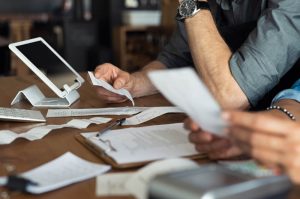VAT on expenses: Which are subject to VAT and which ones aren’t?

If your business earns more than £85,000 in turnover per year, you’re required to register for VAT. This means you are responsible for charging VAT to your customers but you can also reclaim any VAT you’ve paid on VATable supplies you bought for your business. The difference between the VAT charged and the VAT paid is the amount you’ll need to pay to or reclaim from HMRC. But VAT isn’t straightforward – there are different rates of VAT for different types of goods and services, so let’s get into the detail to make it clearer.
VAT on expenses recharged to the customer
HMRC requires that businesses must add VAT at their standard rate (usually 20%) to any expenses that are recharged to the customer, irrespective of whether they paid any VAT on those expenses. For example, if you incur postage costs when you send a letter to a client, this is a normal business expense and if you are recharging it to your client, you must add VAT.
However, there are some instances where you are not required to charge VAT, nor can you reclaim VAT for charges that are passed onto your client. These are known as disbursements and must meet strict criteria [1] to be classed as such for VAT purposes:
- you acted as an agent for your customer and paid the supplier on your customer’s behalf
- your customer received, used or had the benefit of the goods or services you paid for on their behalf
- it was not your responsibility to pay for the goods or services, it was your customer’s
- your customer knew that the goods or services were from another supplier and you had permission from your customer to make the payment
- the exact amount you incurred is passed onto your customer when you invoice them
- each disbursement is shown separately on your invoice
- the goods and services you paid for are in addition to the cost of your own services
For more information on recharged expenses vs. disbursements, visit the government website.
Accounting for VAT on expenses in your business
The UK VAT system has 4 different VAT classifications (correct at August 2023).
- Standard rate VAT is 20%
- Reduced rate VAT is 5%
- Zero rate VAT is 0%
- Exempt VAT means the supply is not taxable.
It’s easy to think that Zero rate Vat and VAT exempt are the same thing, and if you are the end consumer, in effect they are – you’ll pay no VAT, but if you are the seller, there’s a difference that needs to be accounted for so your VAT returns are correct. Put simply, if you supply zero rated goods or services to customers, you can reclaim VAT on costs incurred when making that supply. Examples include children’s books and clothing. However, if you supply VAT exempt goods or services, you are unable to reclaim any VAT incurred in making these supplies from HMRC. Examples of VAT exempt supplies include healthcare, insurance and education.
VAT rates on different supplies
Many supplies such as accounting services, selling clothes, providing taxi services, making cakes, party planning, will writing and so on are VATable at the standard rate of 20%, subject to your VATable turnover exceeding the £85,000 threshold. You can register for VAT even if your sales are below £85K which could be advantageous if you make significant VATable purchases. You can also use the Flat Rate VAT scheme which allows you to:
- pay a fixed rate of VAT to HMRC
- keep the difference between what you charge your customers and pay to HMRC
- you cannot reclaim the VAT on your purchases – except for certain capital assets over £2,000
Some supplies have a reduced VAT rate of 5% including electricity, gas, heating oil and solid fuel, mobility aids for the elderly and smoking cessation products to name a few.
As we’ve already mentioned, some supplies are taxed at 0% and others are VAT exempt. You can find all the current VAT rates on different goods and services on the government website.
Reclaiming VAT on expenses paid by employees
If an employee or contractor pays for goods or services that are used in your business and you fully reimburse them, you can reclaim the VAT. You’ll need a VAT invoice that clearly shows the amount of VAT paid but this can be in the employee or contractor’s name. For example, if an employee pays for travel and accommodation costs out of their own pocket for a business trip and you reimburse these in full, you can claim the VAT back.
Why get a VAT specialist involved?
Even with a sound grasp of VAT rules on expenses, the finer points can still catch you out — especially around complex disbursements, apportionment, or partial exemptions. A VAT specialist can review your expense accounting, identify hidden risks or opportunities, and ensure your reclaim positions are as robust as possible. They’ll help you interpret HMRC’s guidance correctly, avoid costly errors or penalties, and give tailored advice for your business sector. If you want confidence that your VAT on expenses is being handled optimally, engaging a VAT specialist is a smart step.
Getting Your VAT On Expenses Correct
If you are unsure about whether you are handling your VAT correctly or if you are getting close to the VAT threshold where you are obliged to register, get in touch with us for some free advice on your best next step.
Our team of highly qualified bookkeepers and accountants will let you know what you need to do to ensure your VAT on expenses is correct and you don’t run into problems with the VAT man. Call us 01322 250001 for a free no-obligation chat about our comprehensive accounting and VAT services.
Sources
[1] https://www.gov.uk/guidance/vat-costs-or-disbursements-passed-to-customers

